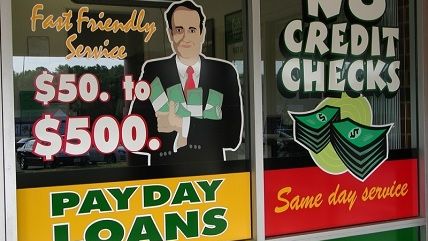Feds Know What's Best For Your Personal Finances
Cracking down on payday lending

As James Bond once asked, why is it that people who can't take advice always insist on giving it?
The federal government is $19 trillion in debt, yet last week the nation's newest major regulatory agency tossed out 1,300 pages of new rules for the payday lending industry and it did so, we are told, because it is worried about Americans getting into too much debt and being unable to repay.
That's rich.
The new rules issued by the Consumer Financial Protection Bureau (CFPB) will send shock waves through the payday lending industry, likely forcing about 85 percent of storefront payday lenders to shut their doors. But who would shed a tear at the possible demise of that neon-tinged, usurious industry, where people who don't have any money or credit to begin with can get a small amount of cash if they agree to outlandish interest terms.
Certainly not CFPB Director Richard Cordray.
"Too many borrowers seeking a short-term cash fix are saddled with loans they cannot afford and sink into long-term debt," Cordray said in a statement announcing the new rules. "It's much like getting into a taxi just to ride across town and finding yourself stuck in a ruinously expensive cross-country journey."
You would think that a guy who once edited the University of Chicago Law Review would know his way around an analogy, but apparently not, because that's a terrible one.
No one is walking into a payday loan shop to borrow $300 and coming out of it saddled with a 30-year mortgage. And how often has anyone gotten into a taxi to go across town and discovered that they are actually being kidnapped, driven across the country and then forced to pay for the trip? Is this a thing that happens?
But if you forget the second half of it, the analogy almost makes sense, because payday loans are kind of like a taking a taxi: you know you're probably getting charged too much, but sometimes you decide that it's worth it because you don't have any better options (don't drink and drive, kids).
Which is exactly the point: Value is subjective. To one person, a $30 taxi ride across town makes sense, while other people will choose to walk/take the bus/stay home. Individuals have to make that decision based on their individual circumstances.
Yes, using payday loans isn't cheap and certainly is not a sound long-term financial strategy—neither is taking a taxi across town every single day. Like taxis, no one should be relying on them on a regular basis.
That being said, there are times when people need a quick infusion of cash and can't get it anywhere else. Forcing those lenders out of business does not change that—some people will, on occasion, need the services of a payday lender, whether they continue to exist or not.
What are those people supposed to do now?
Some of them will be forced to turn to government-subsidized credit unions—and some of those institutions have been lobbying for the CFPB to crack down on payday lenders, as Watchdog.org reported last week—and other people will simply be left with fewer options when they face a personal financial crisis.
Forcing most of the payday lending industry into extinction does not solve that underlying problem.
Much of CFPB's narrative about payday lending—a narrative that has been dutifully picked up by the media—should get a little bit of scrutiny. According to the CFPB, the entire payday loan business is basically a scam where businesses target individuals least likely to be able to repay their loans and the only solution is a strong application of government power.
As Norbert Michel of the Heritage Foundation noted last week, it doesn't take a graduate degree in finance to figure out that's not a solid long-term business strategy. Payday lenders who don't get repaid aren't going to make money and aren't going to stay in business.
Yes, there are some people who can't repay their loans and do indeed get trapped in this "cycle of debt" that we keep hearing so much about. And everyone should think carefully before taking out any loan, especially when we're talking about a loan with an interest rate of triple digits.
People should also be aware of the alternatives to payday loans, and anyone who is already in over their head should take advantage of credit counseling.
But let's not pretend that the government is helping people by shutting down the payday loan industry. It's helping crony capitalists who want to horn in on the business.
And, remember, this is financial advice—although, calling a federal fiat "advice" is really being too kind to federal fiats—coming from an institution $19 trillion (and counting) in the red.
To revisit Cordray's taxi metaphor, consider this: If the government decided that taxis were taking advantage of people with fares that were too expensive and passed regulations to shut down 85 percent of the taxi companies in New York City, what would happen?
Sure, the streets would be emptier and the government would probably pat itself on the back for saving people from paying $50 to go 10 blocks—but there would still be people who need a way to make that trip and now they have fewer options.
When the government decides to decide for you, it means you don't get to decide for yourself. That's life in the Nanny State.
This article originally appeared at Watchdog.org.


Show Comments (86)